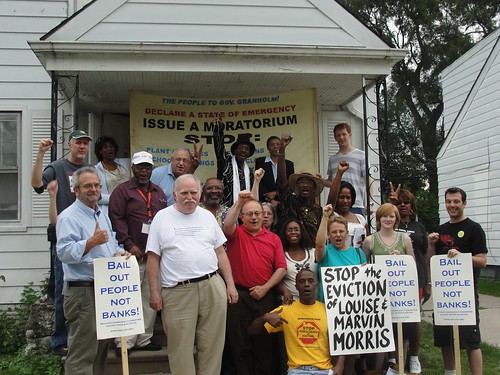
Members and supporters of the Moratorium NOW! Coalition at the home of the Morris' in northwest Detroit. The senior citizens were threatened with foreclosure but have prevailed in their struggle to save their home. (Photo: Bryan Pfeifer), a photo by Pan-African News Wire File Photos on Flickr.
Government orders big banks to reimburse homeowners
BY DAVID ROEDER
Business Reporter
Last Modified: Apr 13, 2011 09:06PM
If there’s a message to the megabanks in the federal government’s crackdown on mortgage practices, it’s this: Act like a small bank.
Personal attention and a little mercy, qualities borrowers often associate with community banks, were on the minds of federal regulators Wednesday as they ordered 16 of the nation’s largest mortgage lenders and servicers to get their own houses in order.
The settlements call for future fines against the lenders and payments to homeowners who were wrongly foreclosed upon. But they left unsettled the rules for those payments and so drew criticism from housing activists and Democrats in Congress. They also do not require banks to reduce principal balances for desperate borrowers.
The agreements were more specific on how lenders and servicers must improve daily business practices. Each must:
--Give each borrower the name of a person as the primary point of contact.
--End the practice of starting a foreclosure even while the homeowner is in talks for a loan modification.
--Step up oversight of third-party loan servicers, businesses that have been involved in “robosigning” of mortgage documents and that have been accused of not providing required counseling to homeowners in default.
--Determine through outside audits how many foreclosures could have been averted in 2009 and 2010.
Settlement terms were jointly published by the Federal Reserve, the Office of Thrift Supervision and the Office of the Comptroller of the Currency. The reforms “will not only fix the problems we found in foreclosure processing, but will also correct failures in governance and the loan modification process and address financial harm to borrowers,” said acting OCC John Walsh.
It was a lofty claim that drew an unusual dissent from the Federal Deposit Insurance Corp. The primary regulator of state-chartered banks called the settlement orders “a first step” that “do not purport to fully identify and remedy past errors in mortgage-servicing operations of large institutions.”
Geoff Smith, senior vice president of the nonprofit research group Woodstock Institute, said the settlements fall short. “For any loan modification program to work, principal reduction has to be a part of it,” he said.
Smith said banks have faced few repercussions for being sloppy in their paperwork and unresponsive to borrowers’ requests for help. “People have lost their homes, yet the banks have saved money by cutting corners,” he said.
The nation’s four biggest banks were covered by the orders. They are Citibank, Bank of America, JPMorgan Chase and Wells Fargo.
Others covered are Ally Financial, Aurora Bank, EverBank, HSBC, MetLife Bank, OneWest Bank, PNC, Sovereign Bank, SunTrust Banks, U.S. Bank, Lender Processing Services and Merscorp.
House Democrats called the orders too lenient and introduced legislation that would require lenders to perform a series of steps, including an appeals process, before starting foreclosures.
“I want to know what abuses (the government agencies) identified, which banks committed them and how their proposed consent agreement is going to fix these problems,” said Rep. Elijah Cummings (D-Md.), ranking member of the House Government and Oversight Committee.
Contributing: AP
No comments:
Post a Comment